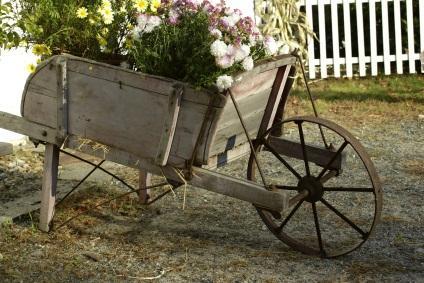The History Book Club discussion
TRAVEL AND TRANSPORTATION
>
INVENTION OF THE WHEEL, WHEELBARROW, WHEELED CARTS (INCLUDING CHARIOTS)
date newest »
newest »
 newest »
newest »
message 1:
by
Bentley, Group Founder, Leader, Chief
(last edited Jan 28, 2019 10:56PM)
(new)
Apr 29, 2013 08:10PM
 Mod
Mod

reply
|
flag
 The Horse, the Wheel, and Language: How Bronze-Age Riders from the Eurasian Steppes Shaped the Modern World
The Horse, the Wheel, and Language: How Bronze-Age Riders from the Eurasian Steppes Shaped the Modern World by David W. Anthony (no photo)
by David W. Anthony (no photo)Synopsis:
Roughly half the world's population speaks languages derived from a shared linguistic source known as Proto-Indo-European. But who were the early speakers of this ancient mother tongue, and how did they manage to spread it around the globe? Until now their identity has remained a tantalizing mystery to linguists, archaeologists, and even Nazis seeking the roots of the Aryan race. "The Horse, the Wheel, and Language" lifts the veil that has long shrouded these original Indo-European speakers, and reveals how their domestication of horses and use of the wheel spread language and transformed civilization.
Linking prehistoric archaeological remains with the development of language, David Anthony identifies the prehistoric peoples of central Eurasia's steppe grasslands as the original speakers of Proto-Indo-European, and shows how their innovative use of the ox wagon, horseback riding, and the warrior's chariot turned the Eurasian steppes into a thriving transcontinental corridor of communication, commerce, and cultural exchange. He explains how they spread their traditions and gave rise to important advances in copper mining, warfare, and patron-client political institutions, thereby ushering in an era of vibrant social change. Anthony also describes his fascinating discovery of how the wear from bits on ancient horse teeth reveals the origins of horseback riding.
"The Horse, the Wheel, and Language" solves a puzzle that has vexed scholars for two centuries--the source of the Indo-European languages and English--and recovers a magnificent and influential civilization from the past.
A Salute to the Wheel

Evidence indicates the wheel was created to serve as potter’s wheels around 3500 B.C. in Mesopotamia—300 years before they were used for chariots. (Jim Vecchi / Corbis)
Read more: https://www.smithsonianmag.com/scienc...
Always cited as the hallmark of man’s innovation, here is the real story behind the wheel – from its origins to its reinvention
Source: Smithsonian

Evidence indicates the wheel was created to serve as potter’s wheels around 3500 B.C. in Mesopotamia—300 years before they were used for chariots. (Jim Vecchi / Corbis)
Read more: https://www.smithsonianmag.com/scienc...
Always cited as the hallmark of man’s innovation, here is the real story behind the wheel – from its origins to its reinvention
Source: Smithsonian
The Wheel Invention
 by
by
 Richard W. Bulliet
Richard W. Bulliet
Synopsis:
In this book, Richard W. Bulliet focuses on three major phases in the evolution of the wheel and their relationship to the needs and ambitions of human society. He begins in 4000 B.C.E. with the first wheels affixed to axles. He then follows with the innovation of wheels turning independently on their axles and concludes five thousand years later with the caster, a single rotating and pivoting wheel.
Bulliet's most interesting finding is that a simple desire to move things from place to place did not drive the wheel's development. If that were the case, the wheel could have been invented at any time almost anywhere in the world. By dividing the history of this technology into three conceptual phases and focusing on the specific men, women, and societies that brought it about, Bulliet expands the social, economic, and political significance of a tool we only partially understand. He underscores the role of gender, combat, and competition in the design and manufacture of wheels, adding vivid imagery to illustrate each stage of their development.
 by
by
 Richard W. Bulliet
Richard W. BullietSynopsis:
In this book, Richard W. Bulliet focuses on three major phases in the evolution of the wheel and their relationship to the needs and ambitions of human society. He begins in 4000 B.C.E. with the first wheels affixed to axles. He then follows with the innovation of wheels turning independently on their axles and concludes five thousand years later with the caster, a single rotating and pivoting wheel.
Bulliet's most interesting finding is that a simple desire to move things from place to place did not drive the wheel's development. If that were the case, the wheel could have been invented at any time almost anywhere in the world. By dividing the history of this technology into three conceptual phases and focusing on the specific men, women, and societies that brought it about, Bulliet expands the social, economic, and political significance of a tool we only partially understand. He underscores the role of gender, combat, and competition in the design and manufacture of wheels, adding vivid imagery to illustrate each stage of their development.
Books mentioned in this topic
The Wheel: Inventions and Reinventions (other topics)The Horse, the Wheel, and Language: How Bronze-Age Riders from the Eurasian Steppes Shaped the Modern World (other topics)
Authors mentioned in this topic
Richard W. Bulliet (other topics)David W. Anthony (other topics)


